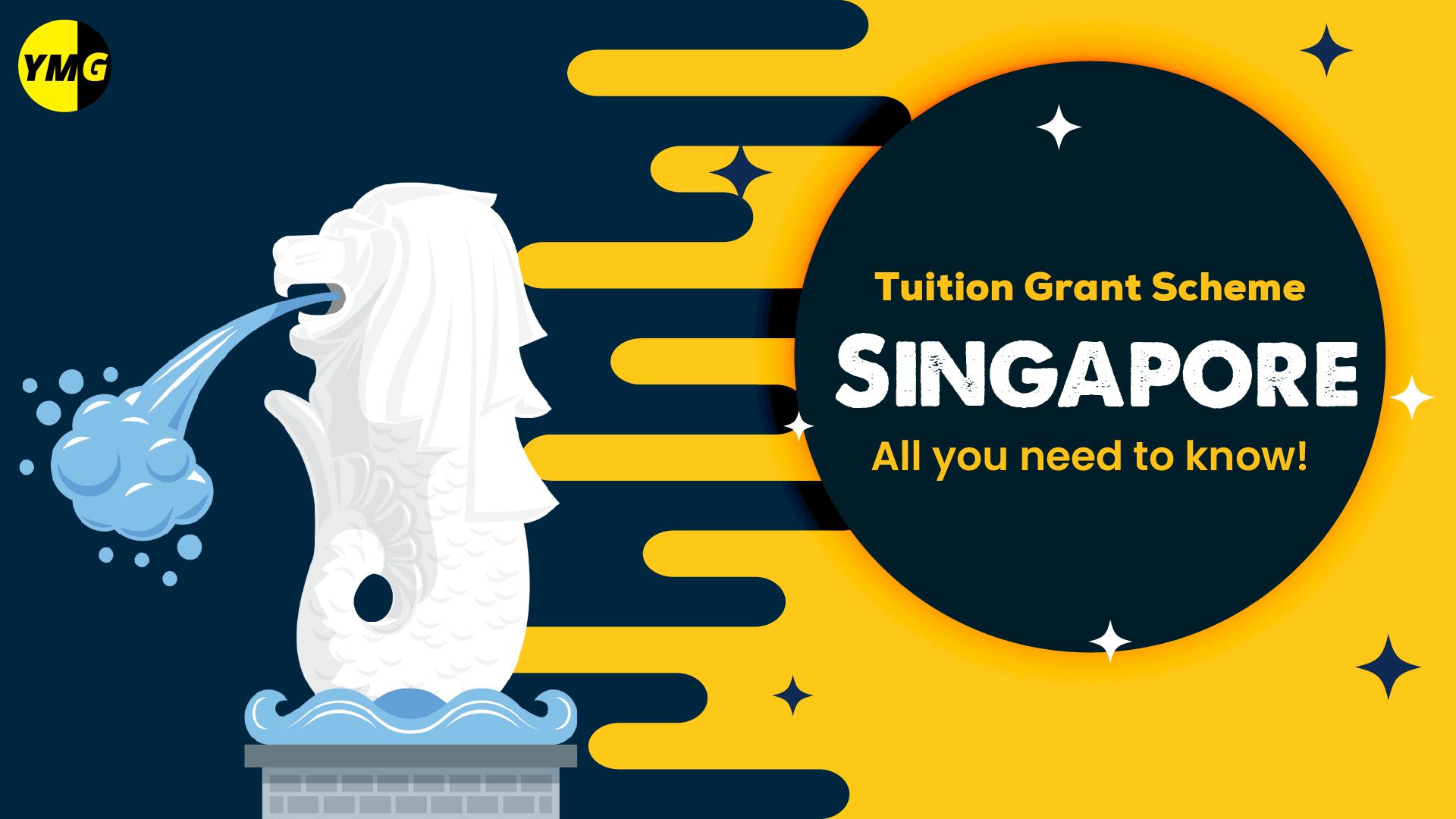Tuition Grant Scheme Singapore: All you need to know!


As one of the most renowned education systems globally, Singapore provides ample opportunities for international students to pursue higher education. One such important initiative is the Tuition Grant Scheme, which reflects Singapore's commitment to making quality education accessible to all. This blog will explore everything you need to know about the scheme: its benefits, eligibility criteria, the application process, and how it contributes to Singapore's thriving education landscape.
Tuition Grant Scheme
The Tuition Grant is provided by the Government of Singapore - Ministry of Education (MOE) to help students manage the costs of full-time tertiary education in Singapore up to a maximum of 10 semesters. The scheme is eligible for selected diploma or undergraduate studies in polytechnics, institutes of Technical Education, arts institutions, and autonomous universities in Singapore. The grant amount varies depending on the course of study and the student's nationality.
Eligibility for International Students
Eligible international students can receive tuition grants for selected full-time diploma and undergraduate courses in the Institutes of Higher Learning (IHLs).
- You are eligible for the tuition grant if you have not already received a subsidy, sponsorship, or scholarship from the Singapore Government to obtain qualifications equivalent to your course or higher.
Grant Tier
In addition, there are three tiers of tuition grants: Tier A, Tier B, and Tier C
- Tier C provides tuition grants to international students
- Tier B grant is for permanent citizenship holders of Singapore
- Students of Singapore qualify for the Tier A grant
Here's a list of top courses and the Tuition Grant offered by the Government of Singapore:
Programs | International Students (Tier C) | Singapore Permanent Residents (Tier B) | Singapore Citizens (Tier A) |
| $21,901 | $14,050 | $9,550 |
Nursing | $21,346 | $13,700 | $9,750 |
| $21,901 | $14,050 | $9,550 |
Dentistry | $35,274 | $22,800 | $15,050 |
Architecture (Coursework Program) | $19,378 | $12,450 | $8,900 |
Public Health (Coursework Program) | $27,956 | $23,550 | $23,500 |
Here's a comparison list of tuition fees payable by students NOT in receipt of MOE Subsidy:
Programs | Fees payable by Singapore Citizens | Fees payable by Singapore PR & International Students |
| $37,692 | $39,678 |
Nursing | $21,346 | $13,700 |
| $39,474 | $41,563 |
Dentistry | $68,762 | $71,207 |
Architecture (Coursework Program) | $39,984 | $39,984 |
Public Health (Coursework Program) | $93,872 | $94,076 |
Programs Of Study
The grant is offered for various full-time diploma courses at polytechnics, undergraduate degrees at autonomous universities, and art course institutions. Let's look at the eligible universities for the Tuition Grant Scheme:
Autonomous Universities in Polytechnics
You may receive tuition grants for all full-time undergraduate and diploma courses in these institutions:
- National University of Singapore (NUS)
- Nanyang Technological University (NTU)
- Singapore Institute of Technology (SIT)
- Singapore Management University (SMU)
- Singapore University of Social Sciences (SUSS)
- Singapore University of Technology and Design (SUTD)
- Nanyang Polytechnic (NYP)
- Ngee Ann Polytechnic (NP)
- Republic Polytechnic (RP)
- Singapore Polytechnic (SP)
- Temasek Polytechnic (TP)
Art Institutions
You may receive tuition grant for full-time diploma courses in these institutions:
- LASALLE College of the Arts
- Nanyang Academy of Fine Arts (NAFA)
Bond Obligation
- Upon graduation, you must work full-time for 3 years with a valid work pass in a Singapore entity.
- You are liable for liquidated damages if you withdraw from a course or have been terminated.
- If you have obtained a Permanent Residency in Singapore, please inform your institution. You will receive a Tier B Tuition Grant, and your bond obligation remains at 3 years.
How to Apply
Singapore's international students and permanent residents can apply through the MOE TG Online system, including attending the tuition grant signing session to sign the agreement. For more details, students can visit the website of their admitting university.
- Go to the Ministry of Education (MOE) website.
- Click on the “Student Login” option.
- You must have two sureties/guarantors (of any nationality). The guarantors must be aged 21 and above but below 65 and not be un-discharged bankrupts.
- Sign the service obligation agreement to be put under the higher subsidy (and therefore pay a lower tuition fee) and serve a 3-year bond by working in a Singapore-registered company upon graduation.
Benefits
- The Tuition Grant Scheme supports international students' study in Singapore by defraying part of the cost of school fees. Tuition Grant recipients continue to pay higher fees than Singaporean students. Students contribute to the vibrancy of the learning environment and student life in our Institutes of Higher Learning.
- The Scheme is highly beneficial for students as this can make a difference of 81% (approximately) in the tuition fees students pay for a certain course.
- In return for the Tuition Grant, recipients get an opportunity to work in Singapore for three years after graduation to contribute to its economy.
Conclusion
We hope this blog post has shed light on the Tuition Grant Scheme of Singapore for international students. Are you willing to study in Singapore? But stuck with the application process? We have got you covered with our complete application help service! We make sure that every part of your application is consistent, coherent, and perfectly crafted, as the committee would expect in the case of their ideal candidate.
Even if your profile is impressive, a different perspective can make you look better than most applicants out there. We believe this perspective exists for every applicant, including you. Let's build an exceptional application specific to your profile and make your dreams of studying in Singapore come true!
Frequently Asked Questions!

Singapore education has frequently been hailed as among the best globally. News sites have consistently placed Singapore as a top hub for education, besting other developed countries such as Finland, Canada, Sweden, France, Belgium, etc.

With a score of 560, Singapore got the highest overall. This translates to scores that are higher than the OECD average in each academic area: 575 in math, 543 in reading, and 561 in science. Singaporean education is regarded as among of the best in the world. This is said to be partially caused by the educational approach used in the area.

Tuition is often the largest component of the overall cost of education, especially in higher education like colleges and universities. Course fees, on the other hand, refer to additional charges that may be associated with specific courses or programs.

You should submit an appeal to your institution to apply for the Tuition Grant Scheme. Your appeal will be assessed on a case-by-case basis. If your appeal is successful, you will only receive tuition grant for the remaining duration of your course. Your bond obligation will remain at 3 years.

A Singapore entity is either a company incorporated in Singapore or a foreign company with a substantial connection to Singapore, as per Singapore law. An entity can be a business organization (e.g., a corporation, partnership, or sole proprietorship) or a non-business entity (e.g., government agencies, non-profit organizations, and educational institutions).

According to the official website of National University of Singapore: All Singapore citizens will receive the grant automatically when they commence their studies, while Permanent Residents and international students need to apply for it. Students who apply and accept Tuition Grant offers must only pay subsidized fees.

According to the Ministry of Education of Singapore: You will be liable for liquidated damages. The amount of liquidated damages is calculated based on the total grant amount you have received, plus 10% interest per year, compounded at the end of each academic year, including GST. Payment should be made in one lump sum through electronic fund transfer.

The Banker's Guarantee guarantees that you will serve your bond obligation. If you do not return to Singapore to serve your bond after your deferment ends, MOE will claim it. The amount of the Banker's Guarantee is calculated based on the estimated liquidated damages.

Tuition funds are available to eligible Singapore citizens, permanent residents, and international students for certain full-time diploma and undergraduate courses at Institutes of Higher Learning.

The average cost of education in Singapore is SGD 25,000 to 40,000 for a three-year course. Public universities charge lower tuition fees than private universities. The average fees at public universities may range between $8200 to $9600 per year.




